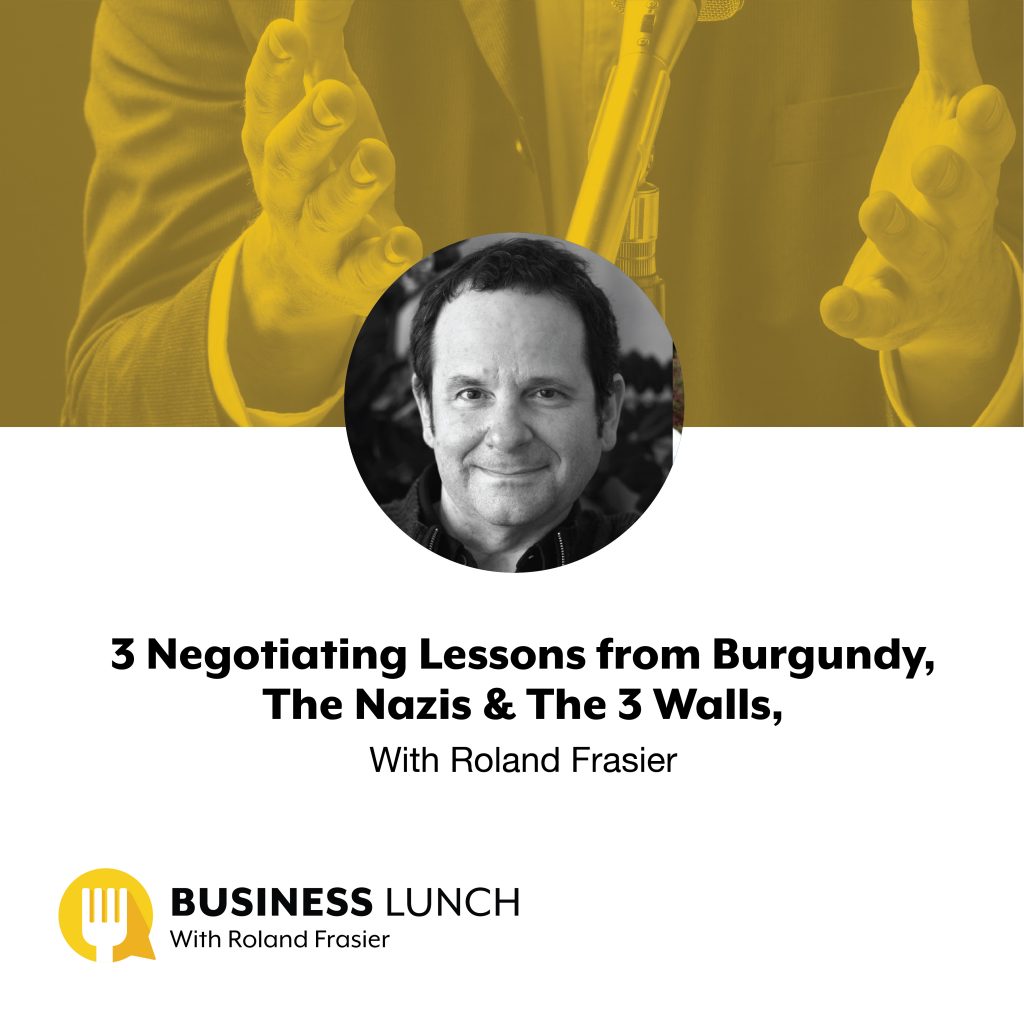Roland Frasier is a phenomenal negotiator. Not only was he a business lawyer for 12 years, but Roland has also founded, scaled, or sold 24 different 7 to 9 figure businesses ranging from consumer products to industrial machine manufacturing companies with adjusted sales ranging from $3 million to $337 million. You don’t manage that kind of success without knowing a thing or two about negotiating. So listen in today for some excellent principles to help guide you through a tough negotiation.
If you enjoy this podcast, be sure to subscribe on ApplePodcasts, write a review, and share this episode with your business-minded friends. If you find yourself needing to do some negotiating right now, you may also find this episode, and this episode (both with Roland) useful.
The Bouchard Story
Back in World War 2, in the 1940s, the Nazis occupied France, and parts of Burgundy were under their control. Orders were given to appropriate large quantities of lower quality French Burgundy for the troops, and higher quality wines were to be purchased and sent to Germany for the officers and higher-ups.
To save as much of their better wine that had not already been designated “Grand Cru,” several of the local producers gathered and established a new designation, “Premiere Cru,” to permit that wine to avoid appropriation.
The plan worked, and that saved quite a bit of wine. But, the best wine of the region was also at risk, and even if the wine was being purchased for the officers, the French didn’t want all of it to leave their region to be lost forever.
Several of the winemakers built false walls in their large, sprawling cellars beneath the city of Beaune in the heart of Burgundy to hide their most precious wines. Among those was Bouchard Pere et Fils (which Roland recently had the pleasure of visiting). Bouchard has an immense underground cellar that covers several blocks beneath the city above, and this cellar stores millions of bottles dating back to the mid-1800s. They chose one of their off the beaten path cellar rooms that held about 35,000 bottles as the primary storage spot for their best wines and then built a false wall behind which to hide their liquid treasure.
However, false walls were not uncommon, and the Nazis knew that they were likely to exist in cellars, so they were not shy about breaking through walls at the end of cellar corridors to check and see if anything was hidden behind them. So, when they arrived at Bouchard’s cellars, the Nazi soldiers did indeed knock down and break through the false wall Bouchard had built.
However, rather than finding the most precious wines, they found a cache of lesser wines instead and, delighted that they had foiled the winemaker’s attempt to hide these bottles, took them all away.
What they did not know, however, was that Bouchard had built not one false wall between its prized 35,000 bottles and the main cellar, but three, and cleverly stashed a large quantity of lesser wine bottles behind each false wall so that the Nazi’s would believe they had found the best wines and not go any further. Fortunately, the soldiers were not well-versed in French Burgundy terroir and therefore were unable to discern the quality level of the wines they found hidden behind the first wall.
The plan worked, and thankfully, the most prized bottles survived throughout the war, hidden safely away behind two additional false walls.
There are several lessons in business and negotiation that we can take from what Bouchard did.
Lesson #1: Construct “False Walls”
Whenever you have an absolute that you cannot give on and do not want your negotiating opponent to discover, take the time to construct several “false walls” that you can allow them to “breakthrough.”
This will allow you to give them the pleasure of getting something in return as you concede the issues that you are perfectly comfortable conceding, which will, in turn, be more likely to allow you to protect your most precious negotiating points.
Listen for Roland’s examples!
Lesson #2: Collaborate & Infiltrate
The French resistance could have opted to take a stand in the cellars and fight it out with the Nazis, but that would have risked the destruction of the cellars and the wine within, as well as the loss of hundreds of French lives.
When faced with an opponent who has superior leverage, cooperate with them, and work collaboratively to find out what they really want. You can usually learn quite a bit by asking questions to get to the bottom of what your opponent really wants. Remember, humans are emotional creatures, and often there is some emotion underlying every human desire. Your opponent may not even know the thing they actually want from the negotiation.
In the case of the Nazis, they wanted wine for the troops and themselves, to escape the horrors of war and to fulfill the orders of their commanders. They didn’t necessarily want or need the very best wine the French had created.
Giving them something that fit the rough description of the physical thing the Nazis wanted (wine in bottles) satisfied the desire for something with enough alcohol to provide an escape and physical bottles to send to their superiors back home in Germany.
“In your negotiations, always ask questions. The person on the other side may tell you they need a $2.5 million purchase price for their company. Still, by asking questions, you may find their real underlying desires are to escape the monotony of a business they no longer enjoy and to provide $250,000 to start the new venture they are salivating to start.” Roland Frasier
If you can satisfy their emotional needs to leave the existing business and start the new one by providing them with $250,000, you have a good chance of drastically reducing the purchase price, maybe even by as much as 90%!
Lesson #3: “Print the Label”
In the case of Bouchard, they were well-aware that they would have to give up much of their lesser wines to the invading Nazis. They knew that they couldn’t protect everything. So, they accepted that fact and created a dividing line between their most sacred bottles (the 35,000 Grand Cru hidden behind the three false walls), their medium quality wines (the ones they hastily designated Premiere Cru), and their least valuable, and most easily replaceable table wines.
The Nazis made the rule that Grand Cru was not to be appropriated and sent to the troops.
The French did not want to destroy their designation system by suddenly elevating all wines to Grand Cru, so they literally printed a new label with a new premium wine designation (Premiere Cru) to protect the wine from appropriation.
As you negotiate, realize that you most likely won’t be able to get everything that you want, but if you pay attention to what your opponent wants (see Lesson #2 above), then you can control the frame by “printing the label” on each negotiating point to achieve your objectives within the terms of their rules.
Listen For Roland’s Examples!
Conclusion
Take these three negotiating lessons from Burgundy, the Nazis, and the 3 Walls and use them in your day-to-day negotiations. Construct “false walls,” collaborate and infiltrate, and print the label.
Whether you’re negotiating corporate acquisitions or just trying to get kids to do their homework, this stuff works and can help everyone reach a happy agreement faster.
Click to find us on Apple Podcasts and other podcast players.
Click here to Listen, Subscribe, and Review Business Lunch on Apple Podcasts
Contact & Follow Roland
On Facebook
On Instagram
Through his Website
Follow Business Lunch Podcast
On Twitter
Thanks so much for joining us this week. Want to subscribe to Business Lunch with Roland Frasier? Have some feedback you’d like to share? Connect with us on ApplePodcasts and leave us an honest review! Your feedback will help us improve the show, and connect us with more high flyers like you.
Click to find us on Apple Podcasts and other podcast players.


